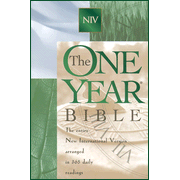The One Year Bible- March 29, 2006

As some of you know this is my second attempt at writing this study this week. The first one was lost to the gremlins wearing Microsoft T-shirts inside my computer. Oh well...it could be worse....
When I was a freshman in High School I tried out for the basketball team. I look back on it now and think about how risky that was to my self-esteem. I came from a small Lutheran school with 14 people in my class and was attending a large public high school where I was one in a thousand. Amazingly I made the team and ended up playing all four years. During that time I had some great coaches and I heard my share of pre-game talks and half time rants. I learned a lot during those years and one thing I learned was that a coach can motivate you to do some hard things. A good coach can get you to do what you would never do on your own. It was during these years I felt the calling of God to be a teacher and a coach (I guess being a pastor is like being a coach and a teacher at the same time). When we look at the book of Deuteronomy I like to think of it as a motivational speech from a great coach. Moses gave this speech to the people of Israel right before they were to enter the Promised Land. Moses himself was not going to be with them. They would have to do it without him and he needed to give them some instructions and some warnings. I like to keep this thought of a coach in mind as I read Deuteronomy.
Where We Have Been
The Old Testament
Last week I told you I would give you the vital statistics for Deuteronomy so here goes:
Purpose: To remind the people of what God had done and encourage them to rededicate their lives to him
Author: Moses (except for the final summary which may have been written by Joshua)
To Whom Written: Israel (the new generation entering the promised land)
Setting: The east side of the Jordan River, in view of Canaan
Key Verse: “Know therefore that the LORD your God is God; he is the faithful God, keeping his covenant of love to a thousand generations of those who love him and keep his commandments. (7:9)
Key People: Moses and Joshua
Like a great coach Moses stands at edge of the promised land, knowing that he will not enter but desiring success and prosperity of his team and he gives a great pre-game speech. He reminds the people of how they got there and how it was because God was gracious. He tells them what they were doing wrong as well, namely complaining. Remember that most of the people he is speaking to were born in the wilderness or don’t remember Egypt. Moses needs to start from scratch with many of them. He enumerates the acts of God and what God has done for the people. He restates the rules for their lives as he goes through the “10 words”. Remember that the first word is a strong message of gospel, “I am the LORD your God, who rescued you from the land of Egypt, the place of your slavery” (5:6 NLT). He wants them to remember these words and to live their lives by them. He then tells them to teach all these things to their children. Following that is one of the most famous prayers in all of Judaism. It is called the Shema, “Hear, O Israel: the LORD our God, the LORD is one. Love the LORD your God with all your heart and with all your soul and with all your strength” (6:4-5 NIV). For more information about the Shema click here. Then Moses goes on to give the people some specific directions and warnings. He tells them that they must destroy completely the people that live in Canaan. No one must be left standing. God will assure their victory, but they must follow his guidelines. The people must also not get involved with any idol worship or any of the gods that they might find in the land. These things will be a problem for the people. I don’t know if this was prophetic foreshadowing but the people do not follow through on either one. These two issues will continue to haunt the people the rest of their time in the Promised Land (some might say it still haunts the people to this day). Think about these things as you read the rest of the story.
The New Testament
We continue our journey in Luke and there are some amazing passages from this past week’s readings. I like the quote from Jesus, “Healthy people do not need a doctor—sick people do.” We are all definitely sick because of sin. We are all in need of a doctor and the great physician, Jesus himself is there for us. You may have wondered about this “Son of Man” reference that Jesus keeps making reference to. I could write a book about it but the short answer is that he is most likely making reference to Daniel 7 where a “son of man” comes in glory from the clouds to rule. This was what Jesus was on earth to do. I will try to remember to talk about that when we get into Daniel (in November). Jesus’ teachings on loving your enemies should make us all a bit uncomfortable. Do we really have to love them? Remember that because of sin we are enemies of God. He still loved us so much that he sent Jesus to die in our place for us. How many of you would die for your friends let alone your enemies. Just amazing. To a Jew the heart was the center of the emotions, as well as all reason and intellect. When Jesus talks about the good things and the evil things that come from our hearts would really hit home. He is not just talking about emotions here. This is the whole shootin’ match. What you say flows from what is in your heart. So that begs the question, what is in your heart? Is it sin or is it love. If it is sin how can you get rid of it? If it is love, how did it get there? The only way the sin will be removed is through what Jesus did for us. Because of his death he has removed that sin and has put in it’s place love. “We love because he first loved us” (1 John 4:19).
Where We Are Going
The Old Testament
Moses will continue his speech. Keep this context in mind as you read
The New Testament
Coming up we will see a parable (the Good Samaritan), some miracles (healing a dead girl a woman and a boy), Jesus sending out the twelve and the seventy-two, the Transfiguration, and other stories that paint the picture of Jesus as the Messiah.
Key Verses
Luke 5:31
Luke 6:5
Deuteronomy 3:22
Luke 6:27-36
Deuteronomy 4:2
Deuteronomy 4:31
Deuteronomy 4:39
Luke 6:45
Deuteronomy 6:4-9 (The Shema)
Have a wonderful week!!




